Driving commercial and political engagement between Asia, the Middle East and Europe
Driving commercial and political engagement between Asia, the Middle East and Europe
Driving commercial and political engagement between Asia, the Middle East and Europe
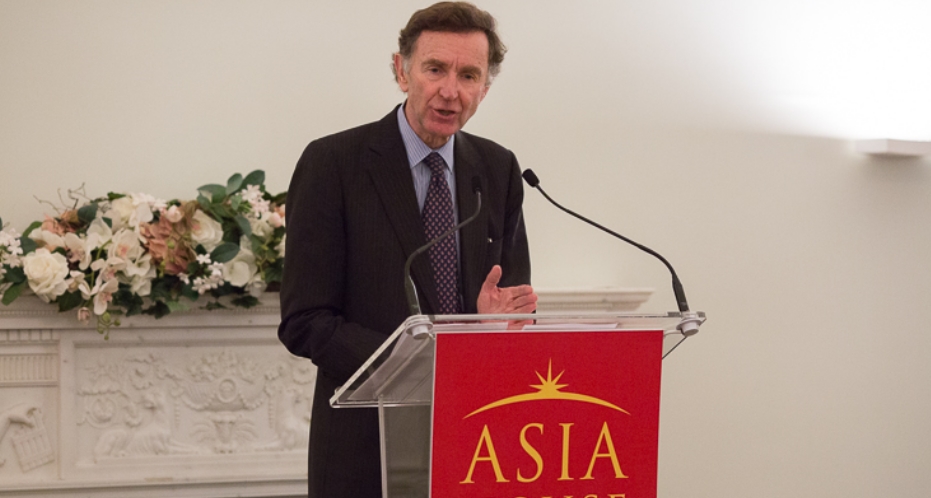
Asia House’s new Chairman Lord Green has spoken of the immense opportunities in Asia despite the world being at a critical crossroads.
In his inaugural speech as Chairman of Asia House, Lord Green said that despite Brexit and the uncertainties of US policy and the implications of both of these in Asia and in Europe, there were vast opportunities in Asia and Asia House had an important role to play.
Lord Green, who assumed the Chairmanship on 1 January, said there were plenty of challenges in Asia, not least declining demographics and a slowdown in growth. He also said the risk to the world’s trading system was greater now than ever before, but the Asian region still offered vast opportunities to businesses in Europe.
The former UK Minister of State for Trade and Investment began his speech at a reception held on Tuesday 24 January, by praising his predecessor Sir John Boyd for his immense contributions to Asia House. Sir John had been chairman of Asia House since 2010 and is now Honorary President.
“It’s a great pleasure to be taking over as Chairman of Asia House and I follow in the footsteps of someone who has given an extraordinary amount to Asia House,” Lord Green said.
“Sir John is the only person I know who speaks very good Chinese, Japanese and Korean. He is also able to talk to you in a very learned and extraordinarily well informed way about almost any topic. He served Asia House through some difficult times and brought it to a new stability and brought in a strong management team led by Michael Lawrence. He has left Asia House in a sound financial condition, so we are entering a very interesting stage, thanks to the work he put in.”
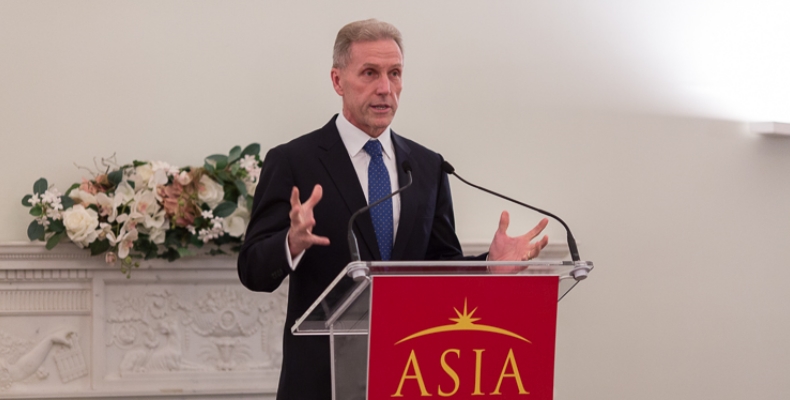
Chief Executive of Asia House Michael Lawrence introduced Lord Green at the reception. Photo by Martyn Hicks
Lord Green, who was also previously Group Chairman of HSBC, said there was nothing more important than making sure that London in the 21st century had a vibrant flourishing Asia House.
“Asia House should be the meeting point for anyone interested in the extraordinary phenomenon which is Asia; whether you are here and do business there or want to do business there; or you are in Asia looking at this part of the world and you want to do business here or invest here; or you are deeply fascinated by Asia.
“Asia House in London is more important than ever because of London’s role in the world – a city which, by some measures, is the most cosmopolitan place on the planet.
“Of course we have Brexit impacting on London’s future in ways which we don’t fully understand, but I think London is adaptable and it will continue to flourish and continue to be a great crossroads. It’s therefore more important than ever that Asia House is here to tell the story of Asia, its changes, its vibrancy and the way it will impact us all,” he told the audience of distinguished business leaders, ambassadors and Asia House corporate members.
Centre of world gravity shifting East
He said the “centre of gravity” was shifting from the West to the East as new economies emerged and great economies re-emerged “putting right the gap that opened up” in the 1820s onwards with the Industrial Revolution. “It used to be said that to make it in the world you had to go West,” Lord Green said.
But he said he would now say “Go East.”
“No one who wants a serious career in this part of the world can do that without a reasonable experience of all that is happening in Asia,” Lord Green said.
He said Asia was a “complex phenomenon”; it was way more than China and the Far East; also way more than India and South Asia. It also incorporates ASEAN, a trading bloc of nearly 700 million people, which he described as “on its way to creating a single market without I think or with a fair chance of avoiding the mistakes made in Europe.”
He then listed Iran, Turkey and Russia as other important centres of influence in Asia.
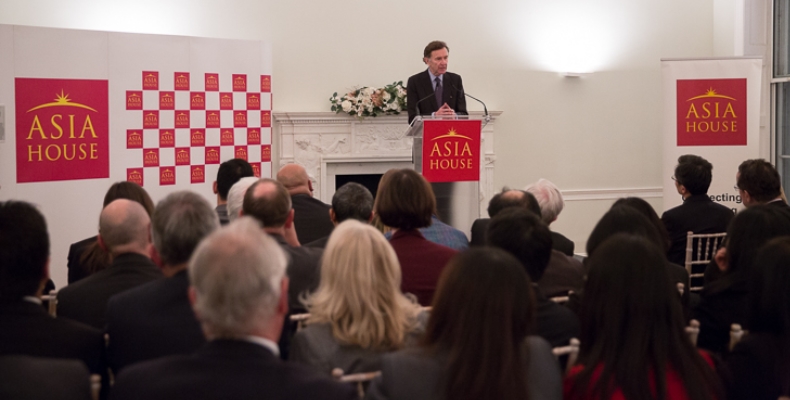
The reception for Lord Green was packed with distinguished business leaders and diplomats. Photo by Martyn Hicks
Declining fertility rates in Asia
“Asia has a population of 4.5 billion which together with Europe makes up two thirds of the world’s population. Urbanisation is now at 50 per cent in Asia and will head to above 70 per cent by 2050,” he said. But he pointed out fertility rates were dropping in many countries in Asia, not least in Turkey, Indonesia and Iran, so Asia as a whole was “heading towards a demographic position where the growth is slowing rapidly and will cap out a generation after they reach fertility replacement rate.”
Belt and Road
The power was shifting within Asia too. India will have taken over from China in terms of population in the next two years, he pointed out and both Turkey and Iran will overtake Germany in the next year, he said.
“The market significance of all of that is that these are increasingly affluent large markets that are demographically beginning to age. The infrastructure implications are vast. The Belt and Road initiative will transform the face of the Eurasian landmass,” he said.
He then referred to China which is building a network of roads and power plants as part of the China-Pakistan Economic Corridor. He gave examples of the new rail links being built from China and Singapore and Pakistan’s new Chinese-funded Gwadar port.
“Things are changing and connecting up, but there is so much more to do,” he said.
He said there were “northern implications” of the Belt and Road concept too – meaning that northern parts of the world, namely the major international ports of Fukuoka in Japan, Busan in South Korea and Vladivostok in Russia, could link up and develop an approach that opens up some of the north and north eastern routes for trade.
“It’s getting more exciting and complex and interconnected. A journey from one end of the Eurasian landmass to another used to take years and now it takes 15 hours by plane,” he said.
He said all this was positive for trade and investment, but also caused geopolitical tensions.
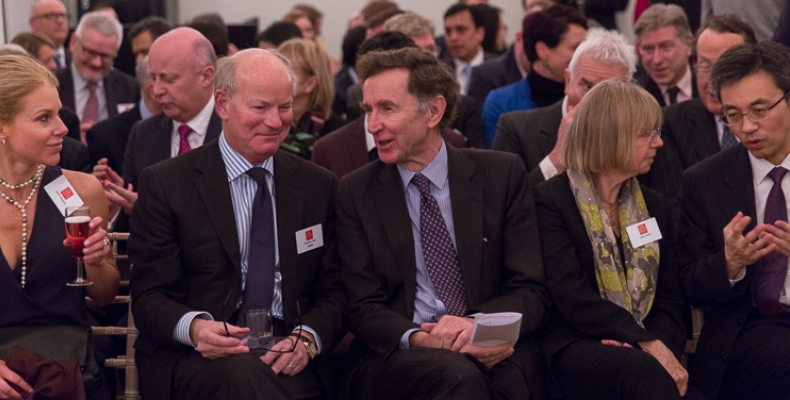
Lord Green, sat next to Lady Green, chats to Stephen Ball, Lead Partner at KPMG. Photo by Martyn Hicks
“Asia House must not only focus on the business and investment implications of Asian connectivity but also our cultural programme is so important. It’s important that we help Asians who want to engage in Asia and Europeans who want to engage in Asa, to understand more of each other and that takes us into cultural domain,” he said, referring to the Asia House Arts and Learning programme.
“Asia is home to some of the most ancient and richest cultures in the world and it’s part of the role of Asia House to make sure that we help people unlock some of those previous secrets because it helps us relate constructively and profitably in business terms with each other,” he added.
Looking ahead at the future, he said that China was emerging as the second largest economy in the world and the largest economy in Asia. India will overtake China demographically soon but India is a long way behind China economically and 20 per cent less of the population of India is urbanised than that of China.
The current Prime Minister of India Narendra Modi is very determined that India should rediscover its cultural roots and its earlier identity in what is a “significant attempt to roll back the earlier secularising heritage of India’s original independence settlement,” he said.
He then spoke about Iran which has more than 2,500 years of history and unlike other Muslim countries is not Arabic and does not think of itself as Arabic, in contrast to Egypt which has evolved differently.
Turkey like India, is rediscovering its older identity and rolling back its secular inheritance but “sailing into difficult seas economically” and “having problematic relations with all its neighbours,” he said.
“Understanding the geopolitics is important to understanding the economic potential and that is underpinned by understanding the identity, the cultural background in which these issues play themselves out,” Lord Green said, setting out his vision as Asia House Chairman.
“There are challenges within the world of Islam. There are specific threats to the security of the region – North Korea very obviously. Demography and the environment are a challenge for many Asian countries, especially China, India and throughout Southeast Asia,” he said.
He said Asia was one of the most densely populated parts of the planet, much higher than the world average. The fact that Asia and Europe are very crowded was one of the factors that explained the way identity and politics worked in the region, as well as the obvious economic opportunities, and the water and energy issues, he went on to say.
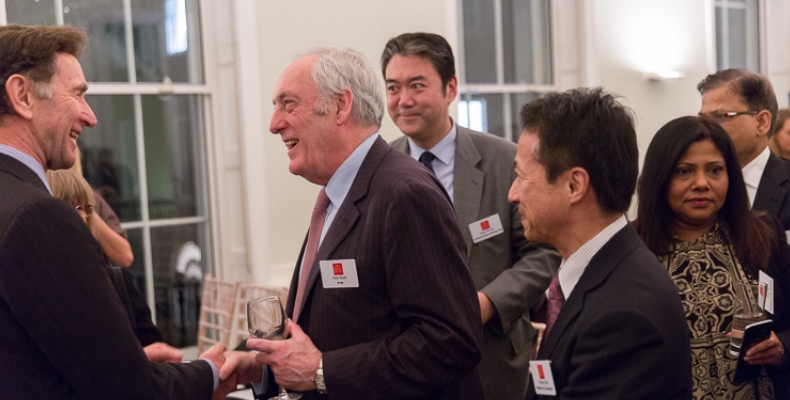
Director at Arup Peter Budd leads the way in greeting Lord Green. Photo by Martyn Hicks
“There is plenty of food for Asia House to get its teeth into. On top of that is President Trump,” he stated.
The new US President has an impact both in Europe and in Asia. What does Trump’s presidency mean in the South China Sea and the Taiwan Straits?” he asked. President Trump’s first executive action was to abandon the TPP. “What does it mean for Korea? And for relations with Russia?” he asked.
He said Brexit was another uncertainty. According to Prime Minister of the UK Theresa May, Brexit is a very determined effort to become a “global Britain and to act as a champion of open trade around the world”, which, he said would mean a serious effort by the British Government to build further connections with Asia.
“This is good news for Asia House,” he said. “It is part of Asia House’s remit to explain to our members and friends, as the events unfold, what Brexit means for doing business here both for an Asian and, in Asia for a British company, and to explain to businesses the implications of how the EU and the UK relate to each other for strategy in Asia,” he said.
“The times are interesting. Yes, there are plenty of challenges. Yes, the risk to the world’s trading system is probably greater now than ever before but there are lots of opportunities in an Asia which is dynamic and changing fast. There are opportunities as well as challenges for all Europeans who seek to engage in it so we at Asia House are here at the right time and place and we have plenty to do,” he said to loud applause.
naomi.canton@asiahouse.co.uk
To find out about becoming a corporate member of Asia House click here.
To find out about Asia House’s upcoming Business & Policy events click here.
